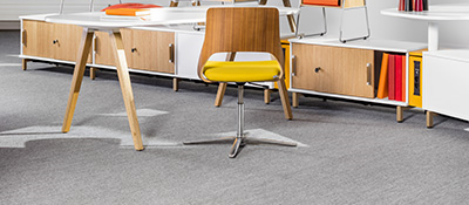November 4, 2016
Corporate responsibility now essential to attract and retain millennials 0
 Corporate social responsibility is no longer seen as more than a nice to have, with those working within the built environment for example, appreciating the role it has in reducing greenhouse gases. But it is also being increasingly seen as a positive way of attracting and engaging the right talent. Now according to a new survey carried out in the US, meaningful engagement around CSR is becoming a business – and bottom line – imperative, impacting a company’s ability to appeal to, retain and inspire Millennial talent. Three-quarters (76 percent) of Millennials consider a company’s social and environmental commitments when deciding where to work and nearly two-thirds (64 percent) won’t take a job if a potential employer doesn’t have strong corporate social responsibility (CSR) practices, according to the 2016 Cone Communications Millennial Employee Engagement Study. Because the millennial generation are the most likely to blend their personal and working lives, it’s more important to them than other generations to view their job as a way to make a positive impact on society, the study suggests.
Corporate social responsibility is no longer seen as more than a nice to have, with those working within the built environment for example, appreciating the role it has in reducing greenhouse gases. But it is also being increasingly seen as a positive way of attracting and engaging the right talent. Now according to a new survey carried out in the US, meaningful engagement around CSR is becoming a business – and bottom line – imperative, impacting a company’s ability to appeal to, retain and inspire Millennial talent. Three-quarters (76 percent) of Millennials consider a company’s social and environmental commitments when deciding where to work and nearly two-thirds (64 percent) won’t take a job if a potential employer doesn’t have strong corporate social responsibility (CSR) practices, according to the 2016 Cone Communications Millennial Employee Engagement Study. Because the millennial generation are the most likely to blend their personal and working lives, it’s more important to them than other generations to view their job as a way to make a positive impact on society, the study suggests.











 When former Google employee Marissa Mayer joined Yahoo as its CEO in 2012, she inherited the company’s vast problems. Though it was once seen as one of the first tech behemoths, Yahoo’s inability to come up with ground breaking products like Google and others, put it in a slow, steady decline. Mayer was immediately tasked with trying to reinvigorate the stagnating company. Her focus was to find a way to identify and retain talent, while phasing out ineffective employees. However, Yahoo’s new management policies have brought about much debate and criticism from HR experts. A controversial book by journalist Nicholas Carlson titled “Marissa Mayer and the Fight to Save Yahoo!” paints a highly critical view of Mayer’s first years as CEO. In response others have defended her, arguing that she has done the best she can with the resources available, but has become a scapegoat for poor management, like so many other women in powerful positions.
When former Google employee Marissa Mayer joined Yahoo as its CEO in 2012, she inherited the company’s vast problems. Though it was once seen as one of the first tech behemoths, Yahoo’s inability to come up with ground breaking products like Google and others, put it in a slow, steady decline. Mayer was immediately tasked with trying to reinvigorate the stagnating company. Her focus was to find a way to identify and retain talent, while phasing out ineffective employees. However, Yahoo’s new management policies have brought about much debate and criticism from HR experts. A controversial book by journalist Nicholas Carlson titled “Marissa Mayer and the Fight to Save Yahoo!” paints a highly critical view of Mayer’s first years as CEO. In response others have defended her, arguing that she has done the best she can with the resources available, but has become a scapegoat for poor management, like so many other women in powerful positions.





 There is no doubt that the UK’s office based knowledge industry is facing a crisis in the form of a ‘wellbeing deficit’. Both the Confederation of British Industry (CBI) and Health and Safety Executive (HSE) have reported record levels of absenteeism, with the latter attributing 23.3 million lost working days to work-related ill-health, such as depression, stress, anxiety and musculoskeletal disorders. A great deal is already known about the causes of the key issues of employee stress and demotivation, but more work needs to be done to establish how organisations can meet their corporate goals with regard to these issues, whilst still engaging, motivating and nurturing their workforce. A significant body of published research has identified that a sense of ‘personal control’ can have a hugely positive impact on employee wellbeing, but how can we engender that control when it comes to creating a productive working environment?
There is no doubt that the UK’s office based knowledge industry is facing a crisis in the form of a ‘wellbeing deficit’. Both the Confederation of British Industry (CBI) and Health and Safety Executive (HSE) have reported record levels of absenteeism, with the latter attributing 23.3 million lost working days to work-related ill-health, such as depression, stress, anxiety and musculoskeletal disorders. A great deal is already known about the causes of the key issues of employee stress and demotivation, but more work needs to be done to establish how organisations can meet their corporate goals with regard to these issues, whilst still engaging, motivating and nurturing their workforce. A significant body of published research has identified that a sense of ‘personal control’ can have a hugely positive impact on employee wellbeing, but how can we engender that control when it comes to creating a productive working environment?














August 17, 2016
Intelligent lighting can enhance workplace wellbeing and productivity 0
by Andy Gallacher • Comment, Environment, Facilities management, Lighting, Wellbeing, Workplace design
(more…)